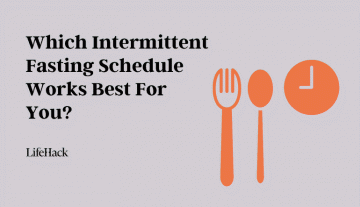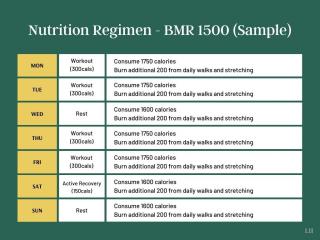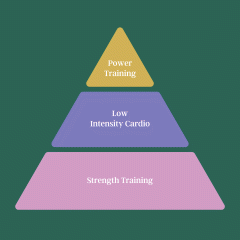Have you also asked what is a good formula for a healthy eating schedule? Or what habits can people do to lose weight?
How do you make sure that you’re eating efficiently without overthinking, over-planing, or over-analyzing food?
You must have realized by now that along with a busy schedule, all the complicated concepts, thoughts, and rules on eating have created anxiety, wasted a lot of time, taken away a lot of joy, and made it more difficult for you to get fit.
Ultimately, you just want to have a simple life where things land in place peacefully. You may have a busy life, but you can still have a healthy eating schedule. Let’s start with believing.
How to Set a Healthy Eating Schedule
1. Believe It’s Simple
If you’ve been spending hours thinking about your diet, researching how you can maintain a target weight, and planning your day-by-day, believing that a good eating schedule is a simple matter.
It’s because you’ve experienced it differently for a long time. Many people think eating healthy is a challenge, only to realize they can just sit back and let it cruise while getting much better results.
Overcomplicating eating only leads to stress. This unnecessary stress works against you both physically and mentally.
Physical
Chronic stress negatively affects your hormones, making you prone to overeating junk food which creates more stress and anxiety.
Stress also slows down your metabolism, interrupts your sleep, and over time, leads to chronic inflammation. Chronic inflammation has been proven by science to be at the core of almost every single chronic disease, including:
⌄ Scroll down to continue reading article ⌄
⌄ Scroll down to continue reading article ⌄
Diabetes Heart diseases ObesityEmotional
Stress about food deprives you of lots of joy and isolates you from social interactions. It can lead to a mental downward spiral, creating more severe eating problems such as:
Food obsession Eating disordersSo it doesn’t serve you to consider eating complicated in any way, and more importantly, it’s not even true.
If you believe food is your enemy (which is why you have to think critically and plan meticulously to prevent it from harming you), let’s just bust the myth right now by looking at how many people in this world can have an easy and almost care-free life of eating while being fit.
You’ve seen them around, men and women in fitted jeans or sundresses who care about neither the ice cream nor the scale numbers. It happens a lot. You just need to know how to do it intuitively.
But if you choose to believe it’s difficult to eat well, you’re only setting yourself up for a lot of frustration. Beliefs always come before actions.
2. Simplify Eating and Be Flexible
Now that you know the first step is to believe, let’s take that into action to have a good eating schedule.
Routine
If you’ve ever wondered how to eat healthy on a budget and busy schedule, there are plenty of ways to go about it. No matter what routine you set out to take, always prioritize flexibility and make things as easy as possible.
For instance, any program that requires you to spend hours in the kitchen preparing for a meal sets you up for failure, especially if you must work almost 12 hours daily.
If you’ve tried it but failed, remember that it’s not you’re lacking self-discipline or willpower. It’s simply because this mechanism isn’t designed for busy career women who are stretched thin to juggle work, kids, and endless household matters.
⌄ Scroll down to continue reading article ⌄
⌄ Scroll down to continue reading article ⌄
Eating out doesn’t contradict healthy eating as long as you’re making good choices. Meal kits are always great if you want to share some great kitchen fun with your family. If you have more time and passion for home cooking, explore and reserve a few simple, delicious, 30-minute recipes of your choice. Then turn the jazz music on while cooking the enjoyable meals.After all, a satisfying meal is not only a tastebud experience but also a mood journey. Go for ease and happiness, and time will fly.
Your Food Choices
If you believe food is your enemy, then you’ll find your choices very limited and feel deprived.
However, establishing healthy eating habits requires open-mindedness and even appreciation of lots of food. This relaxed feeling is also the key to not wasting time overcalculating and overthinking about food.
Here’s a false belief about food that the majority of Americans seem to be buying: “Carbs are the reason for fat gain”
This robust claim in the Western Fad Diet Industry is one of the silliest things you can hear. Just consider how many people in the world’s slimmest and longest-living countries, including Japan, Korea, China, Vietnam, and Italy are treating rice, vermicelli, pasta, and noodles as their staple food and eat a substantial amount of them in almost every meal.
So you need to let go of the limiting beliefs that produce overthinking. Allow freedom and joy first, then you can ask yourself this question: “What really satisfies me?”
If you like salmon, go for it. If you like braised lamb, add it to your recipe list and enjoy it with family. Just make sure for every meal, you also have a good amount of vegetables and fruits to pair with the meat because you need to ensure a great variety of nutrition to maintain the smooth functioning of various organs of your body.
Be flexible and open-minded. Eating is supposed to be a physically and emotionally joyous journey.
3. Let Your Body Do Its Job
99% of people think “calorie-in-calorie-out” is the key to losing weight. If you are one of them and have been dieting for years but still find yourself stuck with the extra 30 or 50 pounds, have you ever questioned that belief at all?
⌄ Scroll down to continue reading article ⌄
⌄ Scroll down to continue reading article ⌄
In fact, weight loss isn’t your willpower’s job but your body’s. Simply put, your body will lose weight organically for you if it’s properly:
Nourished Metabolically optimized Hormonally efficientAll of these require very balanced eating and mood.
The Right Diet
Any restriction-based diets harm these functions by under-serving the body and producing stress. This takes away the body’s ability to properly operate itself and weight sticking around is just a byproduct of that.
Meanwhile, if you’ve been depriving yourself for a long time, you can adopt the pattern of ‘automated’ weight gain just because your body is forced into the mode of fat retention, hormonal imbalance, and creating psychological hunger and sugar cravings by secreting stress hormones.
Your original appetite setting and sense of hunger could become blurry, and you no longer have “stop eating at the right time” as an instinct.
And you could wonder, “how could that be possible?” Easy, chronic inflammation, for example, can cause any of the above.
If you are under all the influences because it’s a part of your body’s programming, a physical effort through dieting and exercising is minuscule. But when your body becomes optimized and efficient nutritionally, hormonally, metabolically, and digestively, you’ll find weight loss a natural side effect of that healing process.
So Where Does This Lead To?
There’s no real healthy eating time schedule. When your body operates well, your ability to eat the right amount of food and the right types of food, intuitively, is an instinct. Just like how your brain automatically knows how far your two feet need to be from each other when you walk so that one won’t step on the other.
You certainly never need to count how many seconds you’ve inhaled just to make sure you’ve got the right amount of oxygen.
⌄ Scroll down to continue reading article ⌄
⌄ Scroll down to continue reading article ⌄
Your body, including the brain, is a very smart system with a built-in instinct. Eating well without spending time counting and overthinking should be the same.
That instinct could be inactive or dormant from being suppressed for too long.
Hitting Home Run
If you have children, you might have observed a few traits regarding how the babies and young toddlers eat such as:
They don’t need to count calories to know if they’ve had too much or too little food. They stop eating when their body is satisfied and got enough, and you can’t make them eat one more bite. They don’t have those cravings for fattening, sugary, and heavily processed food. They don’t have pre-conditioned false, limiting beliefs and fears about food. They don’t become overweight just by eating all kinds of food normally and satisfyingly.This simple phenomenon requires the body’s key senses to systematically work together.
Appetite Tastebuds Hunger signals Metabolic systems Digestive systemsIt’s just a default thing.
To Sum It Up
The only reason you feel insecure about food, overeating, obsessing with diet, and having all these cravings is that this default set-up is on pause.
That’s why you are over-spending so much time and energy on eating. It’s also why you can’t eat well intuitively yet.
But once that instinct is restored, you’ll master eating well to fitness, find it stress-free and easy-breezy, and have plenty of time for pursuing your passion and interests in life.
Featured photo credit: Farhad Ibrahimzade via unsplash.com
⌄ Scroll down to continue reading article ⌄
⌄ Scroll down to continue reading article ⌄





























































